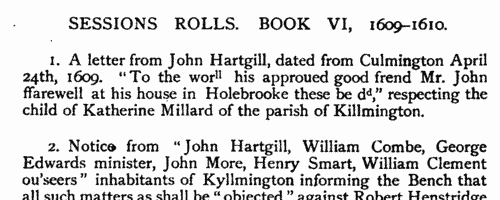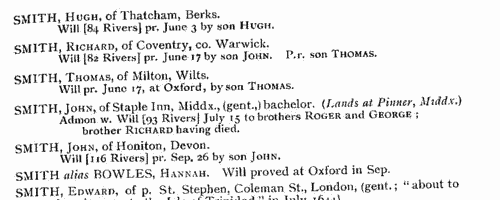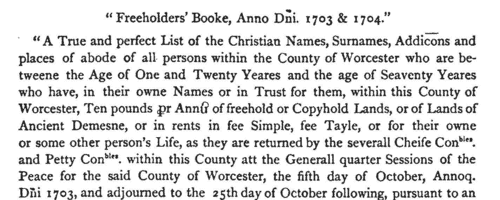Add this eBook to your basket to receive access to all 99 records. Our indexes include entries for the spelling treble. In the period you have requested, we have the following 99 records (displaying 1 to 10): These sample scans are from the original record. You will get scans of the full pages or articles where the surname you searched for has been found. Your web browser may prevent the sample windows from opening; in this case please change your browser settings to allow pop-up windows from this site. Freemen of London
(1540-1550)
The long series of mediaeval registers and books of admission of the freemen of London was destroyed by fire in 1786. Thirty surviving charred leaves were gathered together and rebound, becoming Egerton MS 2408 in the British Museum. The order is jumbled and generally speaking none can be dated with certainty, although all belong to the very end of the reign of Henry VIII and the start of the reign of his son, Edward VI. These are pages from the admission books. Each entry here usually gives the name of the person admitted to the freedom; his father's name, address and occupation; his entitlement to the freedom, usually by having served out an apprenticeship to a citizen, naming the master and his trade. Then there may follow a cross-reference to M. or N., being two volumes of another set of official books denoted by the letters of the alphabet, and following each other in chronological sequence, which evidently gave details of entries into apprenticeships. These other books no longer exist: but the dates given for entry do identify the start of the apprenticeship, and so give by implication a date for the eventual admission to freedom. In the margin is the name of the city ward and the total of the fee and fine paid on admission. | Sample scan, click to enlarge

| Inhabitants of Somerset
(1607-1625)
The Reverend E. H. Bates prepared extracts from the Somerset quarter session records of 1607 to 1625 for publication by the Somerset Record Society (xxiii) in 1907. The period is covered by quarter sessions minute book 1 (1613 to 1620) and part of book 2 (1620-1627); these are based on the rolls of recognizances (taken, discharged and forfeited); criminal indictments (not touched on in Bates's extracts); and sessions rolls 1 to 16 (abstracted by A. J. Monday). The records covered and illustrated by these extracts are introduced under the heads Sessions Business; Relief of the Poor; Apprentices, Bastards and Lunatics; Charities (Alms- and Pest-Houses); Housing the Poor; Roads and Bridges; Rates and Appeals; Houses of Correction; and Drink Traffic. | Sample scan, click to enlarge

| PCC Probates and Administrations
(1647)
The Prerogative Court of Canterbury's main jurisdiction was central and southern England and Wales, as well as over sailors &c dying abroad: these brief abstracts, compiled under the title "Year Books of Probates", and printed in 1906, usually give address, date of probate and name of executor or administrator. They are based on the Probate Act Books, cross-checked with the original wills, from which additional details are, occasionally, added. The original spelling of surnames was retained, but christian and place names have been modernised where necessary. | Sample scan, click to enlarge

| Official Papers
(1690-1691)
The State Papers Domestic cover all manner of business relating to Britain, Ireland and the colonies, conducted in the office of the Secretary of State as well as other miscellaneous records. Includes lists of passes to travel abroad.
| Sample scan, click to enlarge

| Worcestershire Freeholders: Birlingham
(1703)
In 1873 H. Sydney Grazebrook published this transcript of 'an old MS. in the possession of R. F. Tomes, esq., of Weston, near Stratford-upon-Avon. The manuscript is "A True and perfect List of the Christian Names, Surnames, Addic'ons and places of abode of all persons within the County of Worcester who are betweene the Age of One and Twenty Yeares and the age of Seaventy Yeares who have, in their owne Names or in Trust for them, within this County of Worcester, Ten pounds pr Annu' of freehold or Copyhold Lands, or of Lands of Ancient Demesne, or in rents in fee Simple, fee Tayle, or for their owne or some other personís Life, as they are returned by the severall Cheife Conbles. and Petty Conbles. within this County att the Generall quarter Sessions of the Peace for the said County of Worcester, the fifth day of October, Annoq. D'ni 1703, and adjourned to the 25th day of October following, pursuant to an Act of Parliament intituled "An Act for the Ease of Jurors".' We have indexed the whole of the text, constablewick by constablewick. Usually the lists give full name, but only occasionally is occupation stated. | Sample scan, click to enlarge

|  Masters of Apprentices registered at Taunton in Somerset
(1713-1715) Masters of Apprentices registered at Taunton in Somerset
(1713-1715)
Apprenticeship indentures and clerks' articles were subject to a 6d or 12d per pound stamp duty: the registers of the payments usually give the master's trade, address, and occupation, and the apprentice's father's name and address, as well as details of the date and length of the apprenticeship. There are central registers for collections of the stamp duty in London, as well as returns from collectors in the provinces. These collectors generally received duty just from their own county, but sometimes from further afield. July 1713 to April 1715. (The sample entry shown on this scan is taken from a Norfolk return) | Sample scan, click to enlarge

|  Masters and Apprentices
(1716) Masters and Apprentices
(1716)
Apprenticeship indentures and clerks' articles were subject to a 6d or 12d per pound stamp duty: the registers of the payments usually give the master's trade, address, and occupation, and the apprentice's father's name and address, as well as details of the date and length of the apprenticeship. 3 August to 31 December 1716. | Sample scan, click to enlarge

|  Masters of Apprentices registered in Somerset
(1723-1726) Masters of Apprentices registered in Somerset
(1723-1726)
Apprenticeship indentures and clerks' articles were subject to a 6d or 12d per pound stamp duty: the registers of the payments usually give the master's trade, address, and occupation, and the apprentice's father's name and address, as well as details of the date and length of the apprenticeship. There are central registers for collections of the stamp duty in London, as well as returns from collectors in the provinces. These collectors generally received duty just from their own county, but sometimes from further afield. Because of the delay before some collectors made their returns, this register includes indentures and articles from as early as 1722. (The sample entry shown on this scan is taken from a Norfolk return) | Sample scan, click to enlarge

|  Masters of Apprentices registered in Somerset
(1728-1731) Masters of Apprentices registered in Somerset
(1728-1731)
Apprenticeship indentures and clerks' articles were subject to a 6d or 12d per pound stamp duty: the registers of the payments usually give the master's trade, address, and occupation, and the apprentice's father's name and address, as well as details of the date and length of the apprenticeship. There are central registers for collections of the stamp duty in London, as well as returns from collectors in the provinces. These collectors generally received duty just from their own county, but sometimes from further afield. (The sample entry shown on this scan is taken from a Norfolk return) | Sample scan, click to enlarge

|  Masters and Apprentices
(1740) Masters and Apprentices
(1740)
Apprenticeship indentures and clerks' articles were subject to a 6d or 12d per pound stamp duty: the registers of the payments usually give the master's trade, address, and occupation, and the apprentice's father's name and address, as well as details of the date and length of the apprenticeship. 6 October to 3 December 1740 | Sample scan, click to enlarge

|
Research your ancestry, family history, genealogy and one-name study by direct access to original records and archives indexed by surname.
|












